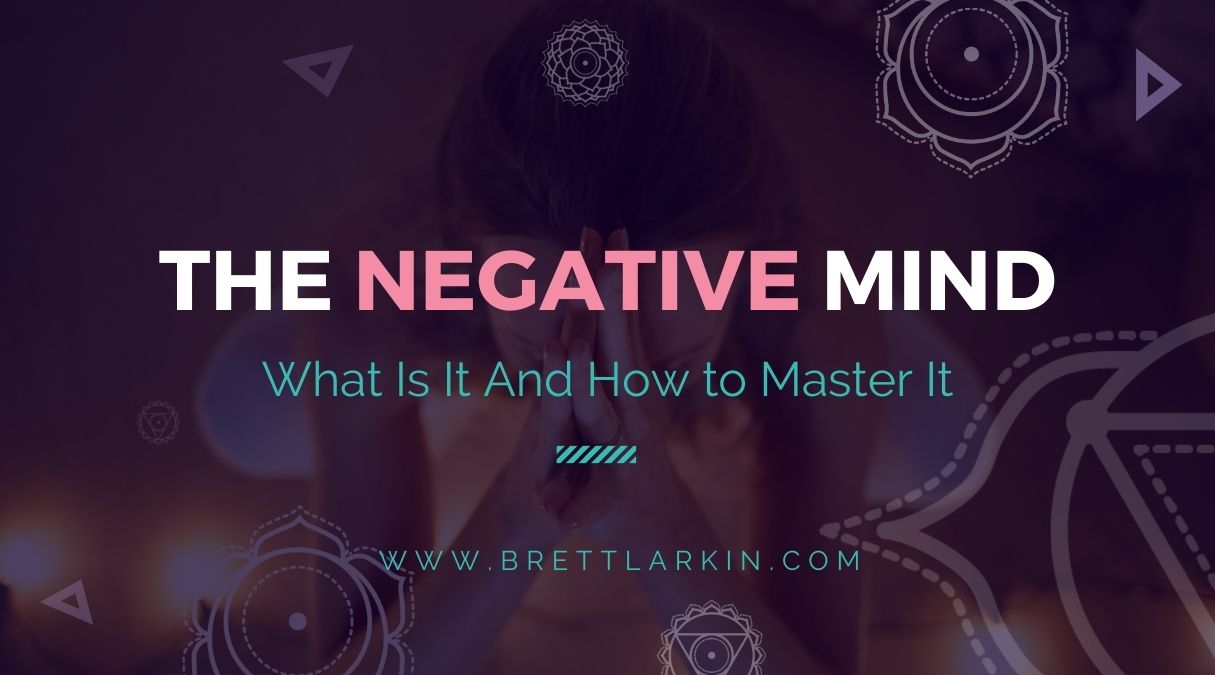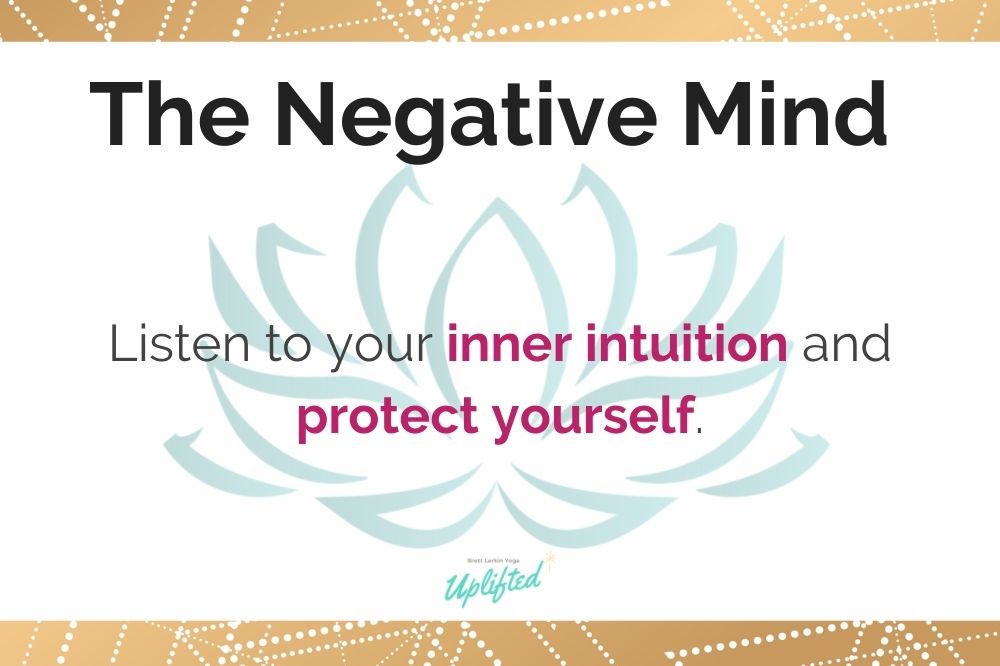So… Why am I blogging about a negative mind? That sounds super scary and dark YIKES! 😬
Aren’t yogis supposed to be all love and light and everything?
The answer is this: We don’t know light without darkness. This is built into our very understanding of the word for our most respected teachers in yoga!
Kundalini yoga defines guru as “the one who leads from darkness into light”. In our Kundalini University Teacher Training, Guru Singh speaks of the training as a method of guiding your own self from darkness back into light.
In the philosophical system of the 10 bodies in Kundalini yoga, the negative mind is the second body (coming after the soul body), and is the most primal of the mental bodies; the positive mind is the third light body, and the neutral mind is the fourth. This system proposes that we need all three mental bodies to coexist in harmony – so yes, we do need a negative mind! We can’t move from darkness to light without it.
In this article, we will learn how to embrace, rather than reject, the negative mind and integrate it into our powers of complete powers of perception.
What is the Negative Mind in Yoga?
Here’s a visual for you: Imagine your negative mind as an inner bodyguard. It enforces our boundaries. It is the protective voice that helps us to deeply consider the ‘why not’ in situations. The presence of this critical perception might make you feel that the negative mind is anti-life and and a bit of a pain. But! Imagine this perception as a form of protection, and you’ll be able to appreciate its value in your wellbeing.
Characteristics of The Negative Mind
Affirmation: I trust my intuition to protect me from obstacles on the path to achieving my full potential.
Qualities: A healthy negative mind is able to prepare for all possibilities. It might be prepared for the worst, but it also allows us to hope for the best, and make decisions to get there. This can manifest as:
- The ability to respond to dangerous situations
- Seeing challenges and issues as opportunities for improvement
- Being secure in who you are
- Effective problem-solving
- The ability to discern negative mental frequencies in meditation and adapt your practice towards your highest vibration
The negative mind is seated in the most primal – yet sacred! – part of our brain, the medulla (or brainstem), that controls involuntary functions like the heart rate and signals when we’re low on nutrients and need to hunt. This system is our body’s in-built control center for monitoring thresholds. And what is fear but a response to a threshold being crossed?
Fear is a healthy response that is necessary for our survival. We move away from fear-generating experiences and towards fear-easing ones. In the negative mind’s search for potential problems, it sees areas where improvements can be made and it gets creative in the quest to make them. In this way, the negative mind helps us move closer and closer to living our best lives. When we are living our best life we are secure in who we are and make decisions that support our needs and truth.
We need sadness to know joy; we need fear to keep us safe from danger; and we need anger to motivate us to change.
Balancing the Negative Mind (Second Body)
That being said, we definitely don’t want the negative mind making all of our decisions. Fear can drive us to action, but it can also paralyze us – making everything seem foggy and confusing. This is what to look for when observing the balance of your second body:
Signs of Balance: When the negative mind is balanced, you are able to confidently move through life with a sense of security. You possess:
- A sense for red flags and a deep trust in your intuition
- Hope for improvements in the future
- The ability to honor and enforce boundaries
- Self-confidence in your decision making
- Deep and meaningful relationships with yourself and others
Symptoms of Imbalance: Operating from a place of imbalance can be scary and pretty miserable. With an imbalanced second body, you might experience:
- Being paralyzed by fear
- Loss of your true sense of self while trying to please others and fit in
- Giving away your power, especially to relationships
- Overwhelming worry occupying your thoughts
- Feeling helpless and hopeless
How to Balance the Negative Mind
Meditation For the Negative Mind
- Find a comfortable seat, and elevate the sit bones on a support if you’d like.
- Cup the hands at the heart, with the right hand on top and the right fingers crossing over the left fingers.
- Lengthen the spine and soften the elbows and shoulders. Keep the eyes just slightly open and gaze towards your hands.
- Inhale deeply through the nose. Focus your exhale through rounded lips to blow over your hands.
- As you continue to breathe, allow all thoughts to enter your awareness without labeling them as “negative” or “positive”. Notice the thought and the feeling it brings on the inhale and blow it out to release it with the exhale.
- Continue for 20 minutes.
Abhaya Mudra
This mudra, or hand shape, works with our root chakra and invites in a feeling of safety and comfort. It helps us be present with fear, but also release it. It’s super simple:
- From a comfortable seat, hold your right hand next to your right shoulder.
- Gentle cup the right palm with the fingers pointing upwards.
- Let the elbow soften towards the ribs.
- Place the left hand in any comfortable position.
- Hold the arm position as you breathe deeply for 5 minutes.
If you have 20 minutes available, combine abhaya mudra with my guided meditation to overcome fear for a potent practice to regulate the negative mind.
Stop Worrying and Start Affirming!
Personal affirmations that connect you to your intuition help to balance your negative mind with the conscious, life-affirming energy I encourage you to create your own, but here are some examples to inspire you:
- I stand in my truth and uphold my values
- I hear and listen to my intuition
- I am more than my fear
- I am worthy of enforcing my boundaries in all areas of my life
- I make confident and decisive decisions that serve me
Choose one and journal about it weekly. Remind yourself of your affirmation throughout the week by pausing to remember and recite it mentally.
Get 3 Free Training Vidoes from our Kundalini University Experience & Certification Program

YOU MIGHT ALSO LIKE
- What is Kriya Yoga? The Philosophy and Practice
- Uddiyana Bandha: Tapping Into Your Deep Core
- 4 Reasons Hasta Bandha Is Essential To Your Yoga Practice
- Vitarka Mudra: What It Is and How Do You Use It?
- Shakti Mudra: What It Is and How Do You Do It?
- Garuda Mudra: What It Is and How Do You Use It?
- Kali Mudra: What It Is and How Do You Do It?
- Shunya Mudra: What It Is and How Do You Do It?
- Varuna Mudra: What It Is and How Do You Use It?
- Vayu Mudra: What It Is and How Do You Use It?
- Samana Vayu: The Energy of Balance & How to Access It
- Apana Vayu: The Energy of Release & Surrender
- Udana Vayu: The Ascending Wind
- Prana Vayu: The Breath of Vitality
- Vyana Vayu: The Energetic Secret to Flow
Get 3 Free Training Vidoes from our Kundalini University Experience & Certification Program












